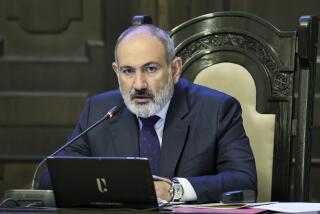Afghan, Soviet Forces Begin Unilateral Truce
- Share via
KABUL, Afghanistan — The Afghan armed forces and an estimated 115,000 Soviet troops began a cease-fire early today in a new attempt to halt a seven-year-old guerrilla war.
Prospects for the unilateral truce were uncertain because several of the rebel leaders based in Pakistan had said in advance that they would not go along with the proposed six-month halt in the fighting.
Kabul, the capital, appeared quiet but tense on the eve of the cease-fire, announced earlier this month by Afghan leader Najib as part of a call for national reconciliation.
Najib has invited commanders of the Muslim guerrillas, known as moujahedeen, to discuss formation of a coalition government with his Soviet-backed regime.
Najib says that more than 400 rebel leaders, with a total armed force of 37,000, have agreed to negotiate in hopes of ending the bitter fighting that intensified when Soviet troops invaded the country in December, 1979.
Rebels Scorn Offer
In Peshawar, Pakistan, however, moujahedeen commander Gulbadin Hekmatyar termed the cease-fire offer “preposterous” and said the rebels will not stop fighting until the Soviet forces leave the country.
Najib, however, has said the Soviet troops were invited in to support the government and will not leave until the United States and other nations stop providing arms to the guerrillas.
The Afghan government invited dozens of Western reporters to Kabul to report on the cease-fire and other elements in the national reconciliation program. Najib, for example, has invited an estimated 4 million Afghan refugees to return to their homeland, which they fled after the intervention of Soviet troops.
While the government contends that Kabul is a secure city, the concern over rebel rocket attacks persists.
Correspondents arriving from Moscow on a special Aeroflot charter flight watched as Soviet army helicopters dropped flares to decoy any heat-seeking missiles that the rebels might have fired as the plane landed.
The truce policy represents a partial about-face for Najib, who came to power last May replacing Babrak Karmal. Shortly after taking over, Najib tried to beef up the Afghan army, plagued by desertions and draft evasion, and told interviewers that the rebels posed no military threat.
Now, however, he is pleading for peace rather than calling his countrymen to the colors. Western diplomats here believe that this represents a change favored by Soviet leader Mikhail S. Gorbachev, who has repeatedly stressed his desire to make a political settlement and bring the Soviet troops home.
‘Tired of Permanent War’
In a Jan. 4 speech outlining the proposed cease-fire, Najib said:
“People have become tired of permanent war, fear and horror and the boundless miseries and the endless tears and sorrows.” The Communist revolution in Afghanistan is “irreversible,” he said, implying that his People’s Democratic Party of Afghanistan would dominate any future government even if it includes opposition elements.
Moscow dramatized its backing for the national reconciliation move by sending Foreign Minister Eduard A. Shevardnadze and high Kremlin official Anatoly F. Dobrynin to Kabul to meet with Najib.
More to Read
Sign up for Essential California
The most important California stories and recommendations in your inbox every morning.
You may occasionally receive promotional content from the Los Angeles Times.










